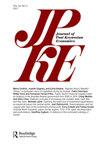基于荷兰非金融私营部门数据的金融不稳定假说的实证应用
IF 1
3区 经济学
Q4 ECONOMICS
引用次数: 2
摘要
摘要本文对荷兰数据中的金融不稳定假说进行了实证分析。回顾了有关这一主题的主要文献,并讨论了各种金融脆弱性指数,以确定荷兰公司是否处于对冲、投机或庞氏体系中。为了进行实证分析,选择了来自不同行业的340家荷兰上市私营公司,这些面板数据包括2005年至2019年的观察结果。这一时期包括荷兰GDP下降的三个案例:2008-2009年、2011年和2014年。我们使用三个金融脆弱性指数进行实证分析。在根据这些标准确定企业制度后,我们选择了Nishi开发的指数进行逻辑回归。我们使用Nishi方法来确定是什么影响了一家公司成为庞氏骗局的概率,从而证实了Minsky对荷兰数据的假设。根据我们的分析,荷兰私营非金融公司成为庞氏企业的概率的重要因素是盈利能力、利率、行业产出和危机。过去几十年,荷兰经济危机的原因既有“破坏稳定”造成的金融脆弱性积累,也有紧缩政策。本文章由计算机程序翻译,如有差异,请以英文原文为准。
An empirical application of the financial instability hypothesis based on data from the Dutch non-financial private sector
Abstract This paper conducts an empirical analysis of the financial instability hypothesis on Dutch data. The main literature on this topic has been reviewed, and various financial fragility indexes to determine whether Dutch firms are in a hedge, speculative, or Ponzi regime are discussed. To do empirical analysis, 340 publicly-listed private Dutch firms from various industries were selected, and these panel data include observations from 2005 to 2019. This period includes three cases of falling GDP of the Netherlands: 2008–2009, 2011, and 2014. We use for our empirical analysis three financial fragility indexes. After identifying the regime of firms according to these criteria, we chose an index developed by Nishi to make a logistic regression. We use the Nishi approach to determine what affects a firm’s probabilities of becoming a Ponzi and thereby confirm Minsky’s hypothesis on Dutch data. According to our analysis, significant factors of the probability that Dutch private non-financial companies will be a Ponzi firm are profitability, interest rate, industry output, and crisis. Both accumulation of financial fragility due to “destabilizing stability” and austerity policy were reasons for economic crises in the Netherlands in the last decades.
求助全文
通过发布文献求助,成功后即可免费获取论文全文。
去求助
来源期刊

Journal of Post Keynesian Economics
ECONOMICS-
CiteScore
1.70
自引率
10.00%
发文量
23
期刊介绍:
The Journal of Post Keynesian Economics is a scholarly journal of innovative theoretical and empirical work that sheds fresh light on contemporary economic problems. It is committed to the principle that cumulative development of economic theory is only possible when the theory is continuously subjected to scrutiny in terms of its ability both to explain the real world and to provide a reliable guide to public policy.
 求助内容:
求助内容: 应助结果提醒方式:
应助结果提醒方式:


